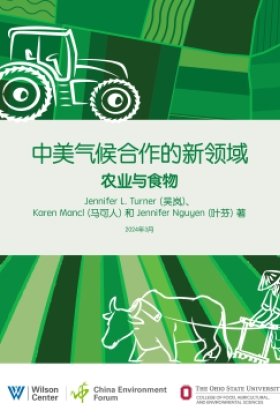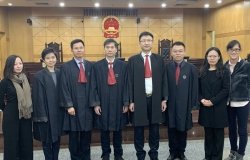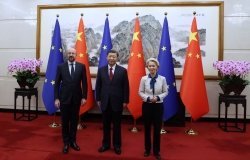Impact of U.S.-China Relations in Asia: Regional Views
The relationship between the United States and China is considered by many as "one of the most important...in the world." Nowhere today does this statement ring louder than in Asia. What are the implications of Sino-U.S. relations for the economic, political, and security structures of interstate relations in Asia? Read more to find out!
Overview
The relationship between the United States and China is considered by many as "one of the most important…in the world." Nowhere today does this statement ring louder than in Asia, where any action by either power can and does have a large impact. What are the implications of Sino-U.S. relations for the economic, political and security structure of interstate relations in Asia? At a September 21 event hosted by the Kissinger Institute on China and the United States, with Asia Program and the Kennan Institute, leading experts from across the region offered their views on this critical subject.
 In the keynote address, U.S. Deputy Secretary of State James Steinberg presented the view from Washington. In pursuing a strategy of deeper engagement with China, the Obama administration is also attempting to incorporate the relationship within the larger context of regional cooperation. According to Secretary Steinberg, this yields two benefits. First, it helps mitigate smaller countries' anxiety of being sidelined; this in turn, "deepens mutual engagement with the region." Second, it is easier for the U.S. and China to find common ground when working in the context of multilateral institutions. The Secretary went on to highlight the many strengths of the U.S.-China relationship, which are beneficial only if pursued mindful of the important consequences of that relationship for all neighboring countries.
In the keynote address, U.S. Deputy Secretary of State James Steinberg presented the view from Washington. In pursuing a strategy of deeper engagement with China, the Obama administration is also attempting to incorporate the relationship within the larger context of regional cooperation. According to Secretary Steinberg, this yields two benefits. First, it helps mitigate smaller countries' anxiety of being sidelined; this in turn, "deepens mutual engagement with the region." Second, it is easier for the U.S. and China to find common ground when working in the context of multilateral institutions. The Secretary went on to highlight the many strengths of the U.S.-China relationship, which are beneficial only if pursued mindful of the important consequences of that relationship for all neighboring countries.
Professor Yuan Ming from Peking University provided the Chinese perspective. Compared to their American counterparts, the Chinese feel more insecure and more defensive in the relationship. Yet in spite of this complexity, the relationship is stable. Although the relationship has progressed over the past two decades, opportunities exist for deeper engagement at the ground level (people-to-people). With respect to the relationship's impact on the region, discussant Douglas Paal observed a trend towards a balance-of- power pattern in Asia. This is due to a combination of America's reengagement with the region, as well as China's newfound self confidence and economic success. This has the major regional players looking for a scenario in which U.S.-China relations do not become too hot or too cold.
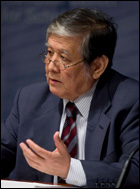 The complex history and relationship Japan has with both the United States and China makes it particularly sensitive to fluctuations in Sino-U.S. relations. According to Professor Seiichiro Takagi of Aoyama Gakuin University in Tokyo, America's relationship with China has influenced Japan's foreign policymaking throughout the entire post-war period, described as an "alliance dilemma." There is a fear that closer ties between the United States and China come at the expense of Japan. On the other hand, as Japan's only formal ally, there is also a fear of being entangled in any future U.S.-China confrontation. According to discussant Gilbert Rozman, Japan's fluctuating responses to changes in Sino-U.S. relations suggest a considerable degree of uncertainty in Japanese strategic thinking; how Japan continues to react to this relationship in the future should be followed closely.
The complex history and relationship Japan has with both the United States and China makes it particularly sensitive to fluctuations in Sino-U.S. relations. According to Professor Seiichiro Takagi of Aoyama Gakuin University in Tokyo, America's relationship with China has influenced Japan's foreign policymaking throughout the entire post-war period, described as an "alliance dilemma." There is a fear that closer ties between the United States and China come at the expense of Japan. On the other hand, as Japan's only formal ally, there is also a fear of being entangled in any future U.S.-China confrontation. According to discussant Gilbert Rozman, Japan's fluctuating responses to changes in Sino-U.S. relations suggest a considerable degree of uncertainty in Japanese strategic thinking; how Japan continues to react to this relationship in the future should be followed closely.
Similar to the Japanese, the Russian perspective of U.S.-China relations is colored by its complex relationship with each power. According to Fyodor Lukyanov, editor of Global Affairs in Moscow, the importance of the U.S.-China relationship lies in the fact that both countries "lay out the whole framework for Russian behavior." Traditionally, modernization in Russia has been linked to the West, (i.e., the U.S. and Europe), but a shift in international focus towards Asia is taking place in the Kremlin today. China's growing economic influence in Russia's so-called "eastern front," (the Asian part of Russia), raises an alarm in the Kremlin. It is for this reason Moscow has both diversified its relations in the region, and welcomes America's presence in Asia. Although the recent "reset" in Russia-U.S. relations was a success, a new agenda factoring in China must be launched in order to maintain this momentum.
Singapore Institute of International Affairs Chairman Simon Tay presented the view from Southeast Asia. With respect to the United States, the Association of Southeast Asian Nations (ASEAN) states are not only comfortable with, but desire an American presence in the region. There is a perception among ASEAN states however, that U.S. power and influence is on the decline globally. Accordingly, there is a concern that domestic ("nativist") politics will distract the U.S. from pursuing a constructive engagement policy with the region. This concern results in some ASEAN thinking "they (the U.S.) are not interested, "so we'll just go at it alone." With respect to China, Southeast Asians do not see China's engagement as an attempt to dominate the region. As a group, ASEAN states look to Washington for strategic leadership, but are economically bound to Beijing. The last thing Southeast Asian states want is to be placed in a situation where they have to choose between the two.
The Indian perspective was presented by Professor Brahma Chellaney of the Center for Policy Research in New Delhi. According to Professor Chellaney, the U.S.-China relationship cannot be understood without "looking at the larger Asian landscape," which faces many challenges. Fervent ultra-nationalism is spreading throughout the region. This is fed by harmful historical legacies that result in negative stereotyping of rival nations, while at the same time inflaming territorial and maritime disputes. Although Asian states have become more economically interdependent, the region remains politically divided. This prevents them from being able to fashion any sort of security community. U.S. policy towards China, its security assurances to its partners, as well as how Asian states deal with the above challenges will shape the region's future security outlook.
By Sandy Pho
Douglas Spelman, Deputy Director, Kissinger Institute on China and the U.S.
Documents & Downloads
Speakers
Douglas Paal
Gilbert Rozman
James Steinberg
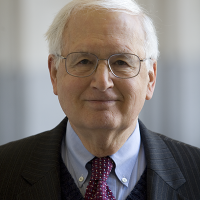
J. Stapleton Roy
Founding Director Emeritus, Kissinger Institute on China and the United States
Seiichiro Takagi
Fyodor Lukyanov
Bruce Parrott
Professor and Director of Russian and Eurasian Studies, SAIS, Johns Hopkins University
Simon Tay
Ernest Bower
Brahma Chellaney
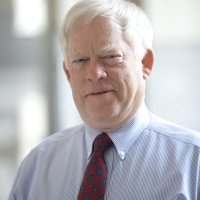
Robert Hathaway
Former Director, Asia Program, Woodrow Wilson Center; Former Public Policy Fellow, Woodrow Wilson Center
Hosted By

Kissinger Institute on China and the United States
The Kissinger Institute works to ensure that China policy serves American long-term interests and is founded in understanding of historical and cultural factors in bilateral relations and in accurate assessment of the aspirations of China’s government and people. Read more

Indo-Pacific Program
The Indo-Pacific Program promotes policy debate and intellectual discussions on US interests in the Asia-Pacific as well as political, economic, security, and social issues relating to the world’s most populous and economically dynamic region. Read more
Thank you for your interest in this event. Please send any feedback or questions to our Events staff.


